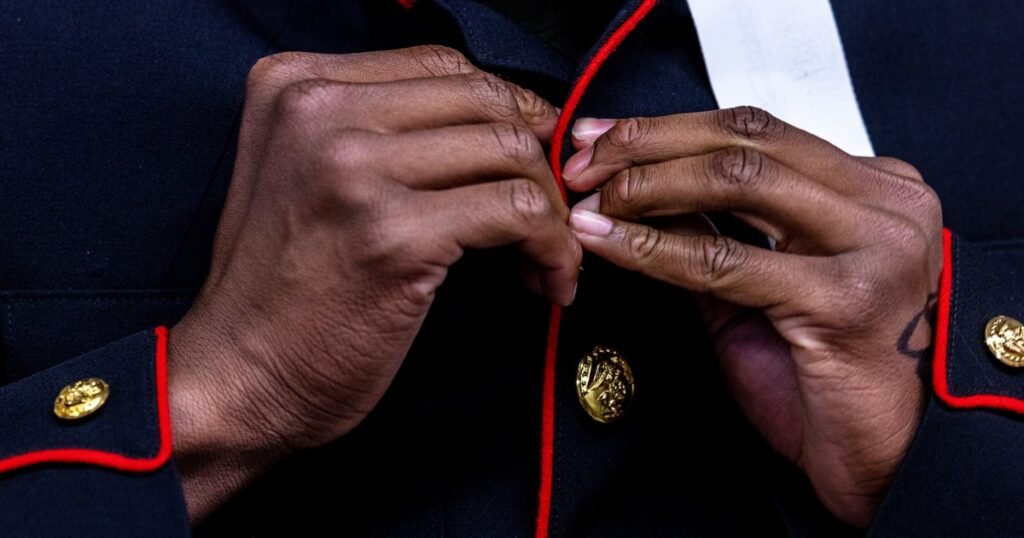Controversy Surrounding U.S. Marine Corps Grooming Policy and Its Impact on Black Service Members
The Razor Bumps Dilemma
For many Black service members, how they are required to maintain their appearance is not just a matter of aesthetics; it can significantly affect their military careers. Air Force veteran Ed Anderson, who has dealt with razor bumps since puberty, recalls the challenges that come with coarse facial hair. "I can’t remember a time when I wasn’t battling painful inflammation and itchy bumps after shaving," he shared.
Historical Context of Shaving Waivers
In 1975, Anderson requested a shaving waiver when he enlisted. This waiver allowed him to bypass the military’s requirement for men to be clean-shaven. For him and other Black service members, these waivers became a symbol of unity.
- Background on Waivers: The shift towards allowing shaving waivers started in the 1970s, with the Navy leading the charge to accommodate the medical needs of soldiers affected by skin conditions related to facial hair.
New Policy and Its Implications
Recently, the U.S. Marine Corps introduced a grooming policy that critics argue may disproportionately affect Black men with coarse hair. This policy, initiated in March, states that service members diagnosed with pseudofolliculitis barbae (PFB)—commonly known as razor bumps—risk expulsion if their condition persists.
- Key Changes:
- Marines must undergo a medical evaluation within 90 days of being diagnosed with PFB.
- If their situation does not improve under a four-part treatment plan within a year, expulsion is at the discretion of commanding officers.
The Statistics Behind PFB
According to the American Osteopathic College of Dermatology, PFB affects up to 60% of Black men, a significantly higher rate compared to other demographics. This has led to concerns that the policy could contribute to ongoing attacks on diversity, equity, and inclusion within military ranks.
Expert Opinions on the New Policy
Dermatologists across the country view this new policy as unnecessarily harsh. Chris Adigun, a dermatologist from North Carolina, remarked, “This is so targeted and intentional. PFB can affect only the way hair follicles appear, and does not affect the body systemically.”
Racial Disparities and Historical Context
An active military dermatologist, wishing to remain anonymous, stated that the new guidelines reflect racial bias. “This is a policy that predominantly affects African Americans due to the nature of facial hair growth,” they explained. The history of regulations relating to PFB dates back decades, leading many to question the motivations behind such strict standards.
The Marine Corps’ Official Position
Military leaders argue that the updated grooming standards are crucial for ensuring “maximum war readiness.” Maj. Jacoby Getty, a spokesperson for the Corps, stated:
“Our priority is to ensure the health and resilience of our Marines while maintaining our warfighting capability. These updates reinforce our commitment to returning Marines to full compliance whenever possible.”
Comparing PFB to Other Skin Conditions
Critics have pointed out the inconsistency in how different skin conditions are treated within military policy. Lauren Ploch, a dermatologist based in South Carolina, emphasized that there aren’t similar regulations for conditions like cystic acne, questioning the fairness of singling out PFB.
- Key Points of Comparison:
- Conditions like cystic acne do not have strict guidelines leading to potential dismissal.
- The ramifications for service members affected by PFB could be more severe.
Call for Change
Anderson believes it is crucial for service members to challenge policies they find unjust. “Being a patriot means questioning what’s going on—not just blindly accepting everything,” he said.
Summary
The recent changes in the U.S. Marine Corps grooming policy have ignited discussions about fairness and racial equity in military regulations. With statistics showing a disproportionate impact on Black service members, experts urge a reevaluation of these standards. As debates continue, it’s vital for voices like Anderson’s to be heard in the quest for a more inclusive military.
Additional Resources
For more insights into facial skin conditions and their treatment, you can read more on topics like pseudofolliculitis barbae and its implications on military grooming standards.
This structure combines engaging storytelling with relevant facts and expert opinions while ensuring maximum SEO optimization and clarity for readers.


